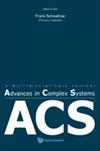基于模因算法的可控领导-追随者网络设计
IF 1
4区 数学
Q4 MATHEMATICS, INTERDISCIPLINARY APPLICATIONS
引用次数: 0
摘要
在许多工程和自然网络系统中,在可控网络优化设计过程中,领导者选择和/或边缘分配一直是人们关注的问题。本文介绍了基于模因算法的leader-follower网络设计的开创性工作,其重点是在保证网络可控制性的同时最小化leader数量或控制能量。本文考虑三个问题:(1)在保证网络可控性的前提下,选择预定义网络中的最小领导数量;(2)在预定义网络中选取控制能量最小的leader;(3)分配节点间的边(交互作用),形成控制能量最小的可控leader-follower网络。所提出的框架可以应用于设计有签名、无签名、有向或无向网络。值得注意的是,这项工作是首次将模因算法应用于可控网络的设计。我们之所以选择模因算法,是因为在解决一些优化问题时,模因算法已被证明比标准遗传算法更高效。仿真结果进一步证明了该方法的有效性和有效性。本文章由计算机程序翻译,如有差异,请以英文原文为准。
Design of controllable Leader-follower Networks via Memetic Algorithms
In many engineered and natural networked systems, there has been great interest in leader selection and/or edge assignment during the optimal design of controllable networks. In this paper, we present our pioneering work in leader–follower network design via memetic algorithms, which focuses on minimizing the number of leaders or the amount of control energy while ensuring network controllability. We consider three problems in this paper: (1) selecting the minimum number of leaders in a pre-defined network with guaranteed network controllability; (2) selecting the leaders in a pre-defined network with the minimum control energy; and (3) assigning edges (interactions) between nodes to form a controllable leader–follower network with the minimum control energy. The proposed framework can be applied in designing signed, unsigned, directed, or undirected networks. It should be noted that this work is the first to apply memetic algorithms in the design of controllable networks. We chose memetic algorithms because they have been shown to be more efficient and more effective than the standard genetic algorithms in solving some optimization problems. Our simulation results provide an additional demonstration of their efficiency and effectiveness.
求助全文
通过发布文献求助,成功后即可免费获取论文全文。
去求助
来源期刊

Advances in Complex Systems
综合性期刊-数学跨学科应用
CiteScore
1.40
自引率
0.00%
发文量
121
审稿时长
6-12 weeks
期刊介绍:
Advances in Complex Systems aims to provide a unique medium of communication for multidisciplinary approaches, either empirical or theoretical, to the study of complex systems. The latter are seen as systems comprised of multiple interacting components, or agents. Nonlinear feedback processes, stochastic influences, specific conditions for the supply of energy, matter, or information may lead to the emergence of new system qualities on the macroscopic scale that cannot be reduced to the dynamics of the agents. Quantitative approaches to the dynamics of complex systems have to consider a broad range of concepts, from analytical tools, statistical methods and computer simulations to distributed problem solving, learning and adaptation. This is an interdisciplinary enterprise.
 求助内容:
求助内容: 应助结果提醒方式:
应助结果提醒方式:


